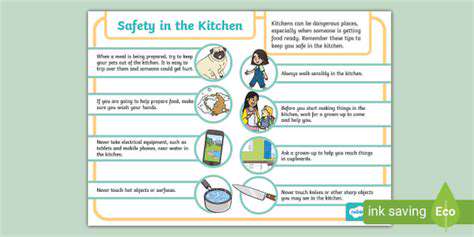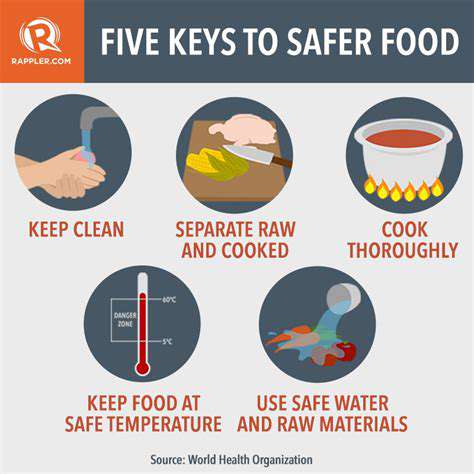Kitchen Safety Tips for Kids: Cooking Safely

Supervision and Clear Expectations
Good supervision makes any activity safer and more successful. It helps people learn what to do and keeps them safe. The person in charge should know the rules well and explain them clearly. This helps everyone understand how to work together safely.
When people know exactly what they should do, they feel more responsible and do better work. Clear instructions help everyone stay focused and work toward the same goals, making the whole experience better for everyone involved.
Establishing Ground Rules
Having simple, easy-to-understand rules creates a safe space where people can learn. Explain all the important rules at the beginning and make sure to follow them the same way every time. The rules should cover how to behave and what to do in different situations.
Being fair and consistent with rules helps people trust the system and each other. If rules change randomly or aren't enforced the same way, people get confused and may stop trying to follow them.
Promoting Open Communication
It's important that everyone feels comfortable asking questions or sharing concerns. When people can talk openly, problems get solved faster and everyone learns more. The person in charge should listen carefully and help when needed.
Creating a Supportive Environment
A good learning space makes people feel welcome and respected. The leader should pay attention to what everyone says and needs. This helps people feel like they belong and can do their best.
When people feel supported, they work better together and trust grows naturally. This trust makes the whole experience more positive for everyone involved.
Encouraging Accountability
People should understand that their actions matter. When they do well, they should be recognized, and if they make mistakes, they should learn from them. This helps everyone take responsibility for their part.
Clear consequences for breaking rules help keep things running smoothly. When people know what to expect, they can focus on learning instead of worrying about unfair treatment.
Addressing Challenges and Conflicts Constructively
Problems will happen, but they can be solved if handled well. The person in charge should know how to help people work through disagreements calmly. Sometimes outside help might be needed for big issues.
Fixing problems quickly stops small issues from becoming big ones. Showing that problems get handled fairly makes everyone feel safer and more comfortable.
Recognizing and Rewarding Success
Celebrating good work helps people stay motivated. Simple things like saying good job or giving small rewards can make a big difference. This encourages people to keep trying their best.
Noticing even small improvements helps people feel proud of what they've learned. When people see that their effort is appreciated, they're more likely to keep working hard.
Food Safety for Young Chefs: Avoiding Contamination

Safe Handling Practices
Keeping food safe is very important when cooking, especially for beginners. Washing hands properly is the most important step. Scrub with soap for at least 20 seconds before touching food, after using the bathroom, and after touching dirty things. Skipping this can spread germs that make people sick. Young cooks need to make this a habit to keep their kitchen clean and safe.
Food temperature matters a lot too. Different foods need to be kept at certain temperatures to stay safe. Put food that spoils easily in the fridge right away. Use a thermometer to check if meat and other foods are cooked enough to kill germs. This simple step prevents many food-related illnesses.
Cross-Contamination Prevention
Germs can spread easily between foods if you're not careful. Keep raw meat separate from ready-to-eat foods to stop this. Use different cutting boards and tools for meats and vegetables - this simple trick makes a big difference. Always wash everything well after using it to kill any leftover germs.
How you store food matters too. Put raw meat on the lowest fridge shelf so its juices don't drip on other foods. These easy habits greatly reduce the chance of making anyone sick from your cooking.
Safe Food Storage and Preparation
Storing food correctly keeps it fresh and safe. Different foods last different amounts of time, so it's important to know which need to be used quickly. Some things go bad fast unless you refrigerate them right away, while others can wait a bit.
Cleaning your tools and surfaces thoroughly is just as important as cooking well. Use the right cleaners and follow the directions to kill germs properly. Keeping your kitchen clean means you can cook without worrying about making anyone sick.
Creating a Safe and Fun Kitchen Environment: Practical Tips
Childproofing Your Kitchen
Making the kitchen safe for kids takes some planning. Lock up cleaners, medicines, and sharp tools where children can't reach them. Special latches can keep little hands from opening cabinets. Teach kids about hot surfaces and that they should ask adults for help. Cover electrical outlets and use guards on appliances to prevent accidents.
Always watch children closely in the kitchen, even when they're just helping with easy jobs. Set simple, clear rules about kitchen behavior and stick to them. This approach prevents accidents while teaching kids good habits.
Proper Storage Techniques for Safety
How you store things affects both safety and freshness. Use containers that seal tightly to keep food good and prevent spills. Organize your pantry and fridge so you can find things easily and see what needs to be used first. Labels help everyone know what's what.
Put heavy items where they won't fall, and keep things you use often within easy reach. Store knives properly in blocks or on racks, away from where kids play. These simple steps make your kitchen both safer and more efficient.
Handling Knives and Sharp Objects
Knives are important tools but dangerous if used wrong. Always cut on a stable surface with the right knife for the job. Don't use knives when you're distracted or not feeling alert. Store knives safely where children can't reach them, and always put them away after use.
Preventing Burns and Scalds
Hot things cause many kitchen injuries. Use thick mitts for hot pots and pans. Keep kids and pets away from cooking areas. Never walk away from cooking food. Be careful opening hot ovens or microwaves - steam burns hurt! Never grab a hot handle without protection.
Fire Safety in the Kitchen
Kitchen fires spread fast. Keep things that can burn away from the stove. Never leave cooking unattended, especially with oil. Keep a fire extinguisher handy and learn to use it before you need it. Know how to put out different types of kitchen fires safely.
Safe Food Handling Practices
Clean hands prevent illness. Wash well before and after touching food. Use separate cutting boards for meats and veggies. Refrigerate food that spoils quickly. Cook foods to safe temperatures. These simple steps keep meals safe to eat.
Electrical Safety Precautions
Check appliances for damaged cords regularly. Don't plug too many things into one outlet. Unplug appliances when not in use. Don't try to fix electrical items yourself unless you're trained. Keep electrical things away from water. These precautions prevent shocks and fires.
- Smart Food Storage: Keep Your Groceries Fresh Longer
- High Protein Vegan Meals: Delicious Plant Based Power
- Knife Skills for Home Cooks: Mastering Basic Cuts
- How to Choose the Freshest Seafood at Your Market
- Storing Coffee Beans for Brewing: Best Practices
- How to Store Apples Long Term: Cool and Dark
- Storing Hard Cheeses in Parchment Paper: Optimal Freshness
- Meal Planning for Beginners: Your First Week of Easy Meals
- Understanding Different Types of Flour: Baking Science
- Sustainable Grocery Shopping: Eco Friendly Choices
- Cooking for One: Portion Control Tips
- Low Sugar Baked Goods for Diabetics: Smart Choices